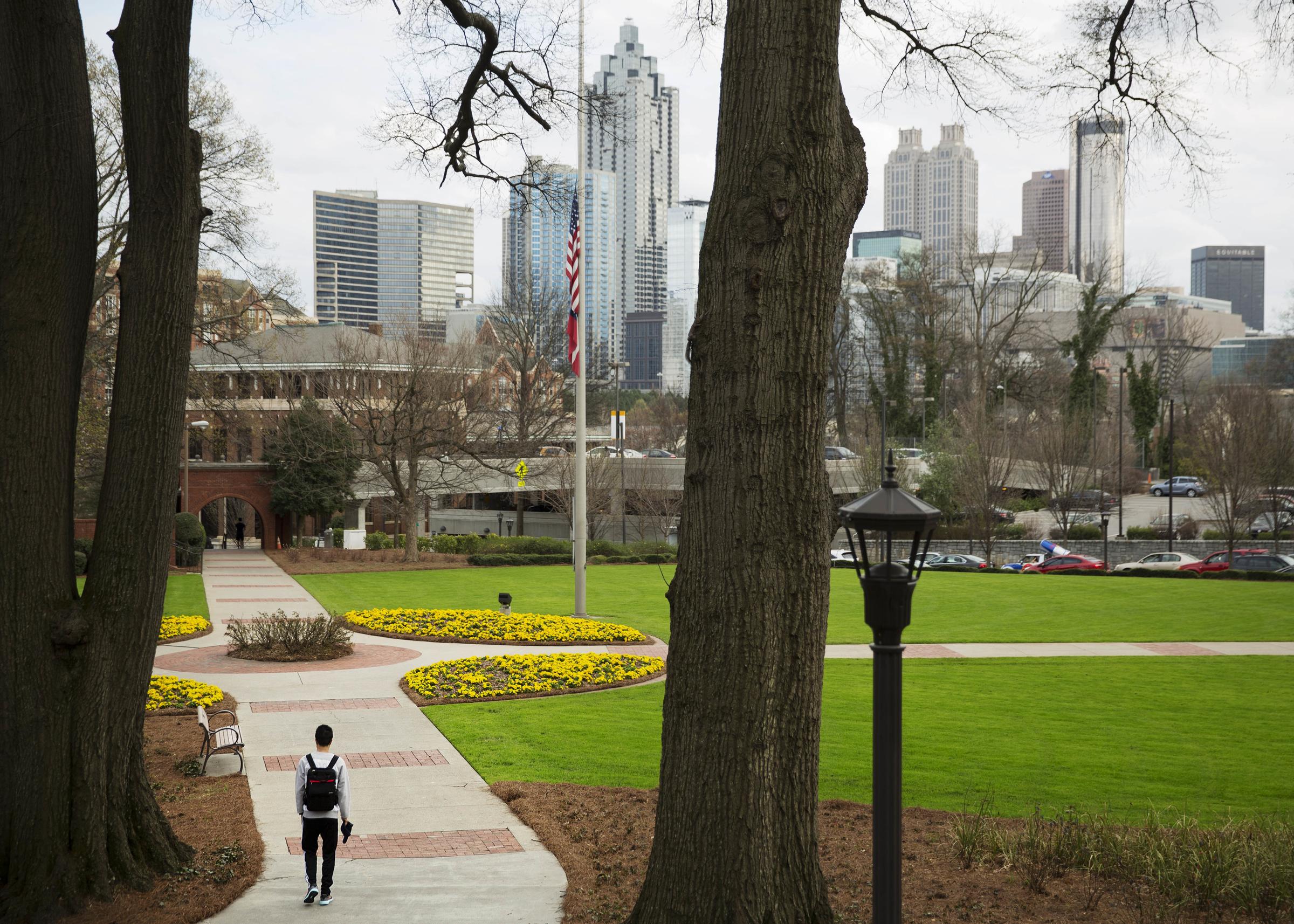Starting Saturday, Georgia’s new campus carry law goes into effect, allowing students who are 21 and older to carry concealed handguns in some spaces at public colleges and universities.
Like us on Facebook
To prepare for House Bill 280, institutions across Georgia are hosting information sessions. Those included have been Kennesaw State University, Georgia College and State University, the University of Georgia in Athens and Georgia Tech.
Georgia Tech was the first institution to address the upcoming law by holding a campus information session for faculty, staff and students on June 14.
“Our objective is to be smart and be safe as we move forward with that implementation,” Pat McKenna, Georgia Tech’s associate vice president for legal affairs and risk management, told a crowd of more than 200 people.
He was joined by Georgia Tech Police Chief Robert Connolly who read from a prepared PowerPoint from the University System of Georgia that will be presented at each of the 28 institutions.
“We want to be consistent throughout the system,” Connolly said as he listed the places where guns can and cannot be carried.
Child care centers are taboo and so are faculty and staff offices, but hallways, lobby spaces and tailgating events are open for concealed guns. Concealed guns also can be carried into classrooms, unless there’s a high school student attending.
But registered gun owners should not expect any help navigating those spaces.
Georgia Tech will not put up any signage with the new law. Those licensed to carry will have to meet with school officials to receive guidance as to where they can and cannot carry. Carrying a gun in a handgun-free space can result in a $25 fine.
“We are not going to put up a map,” Connolly said. “We see that as a compromise to some of our safety.”
The new law also requires campus police to react differently to calls of “gun on campus,” according to Connolly.
“Before, we hear a weapon call [and] we immediately rush to the scene. Now, we have to ask lots of questions,” Connolly said. “This is the Second Amendment right; we can not detain the individual strictly based on a call that someone could potentially be carrying in a classroom.”
Connolly discourages faculty and staff from saying anything to a student should the concealed gun become visible. According to Connolly, faculty and staff are expected to call or text campus police if they feel a handgun is being carried into their handgun-free offices.
Tech professor Richard Barke is uncertain about this new procedure. Having been accustomed to knowing that guns were banned on campus collectively, he questions the efficiency of the procedure.
“I think the problem for a lot of people on campus is that the procedure seems ambiguous,” Barke said. “The reason I ask the ‘what do we do?’ question is [because] it’s not clear what we do.”
For many professors, combating angry students is a daily task. With students 21 and older being able to carry a gun on campus, a concern among the faculty is protecting themselves.
“I’ve been on the receiving end of a lot of incredible anger, mental health issues, and I’m really not feeling safe right now,” Facundo Fernandez, a Tech chemistry professor, said. “In your mind what would be the top three recommendations for faculty members that are basically sitting in their offices without the ability to carry and waiting for someone to walk into their offices with a gun?”
Like many professors in attendance, Fernandez looks to the Georgia Tech police force to ensure that he is safe at all times while performing his job.
“I think it’d be best for us to just come on over and go through things we currently do for active shooter situations on campus and, hopefully, it can bring some comfort and maybe help you understand what we are currently doing,” Connolly said. “And then we can answer all of the ‘what if’ questions and just educate.”
Fernandez was not convinced after the session that things will run as smoothly as promised. Having been a professor at Tech for nearly 15 years, he fears that the new law will cause trouble for the institution.
“This is about a student who is routinely carrying a gun on campus and then becomes angry for a specific situation and then has the means, at that point instantly, to inflict a lot of damage,” he said. “And that’s what worries me.”
While many faculty and staff members expressed apprehension and worry, students in attendance, like senior Michael Robinson, were ready for the law to go into effect and prepared to take all the necessary precautions and steps needed to conceal and carry their firearm.
“I’ve wanted this for pretty much since I was able to carry,” he said. “I came up here mainly to learn and make sure that I did know the law properly before it goes in effect.”
Although he is looking forward to carrying his firearm, Robinson has doubt regarding his ability to respond in an active shooter situation.
“It’s very iffy. If it is something that I am close to perhaps, probably,” he said. “If I’m walking by a










